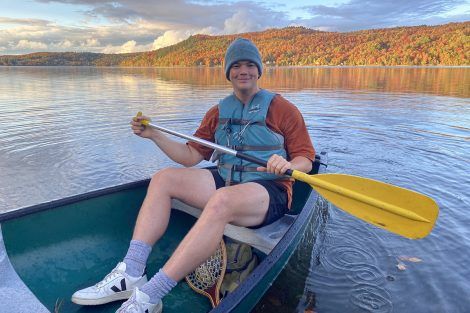May 25, 2021—Will Koh’s childhood interest in the origins of the food on his plate has taken him from an apprenticeship at a whole-animal butcher shop to a position he started in January as a scientist on the nutrition, health, and food safety team at Impossible Foods, a company that makes meat, fish, and dairy products from plants. In a recent interview, he spoke about how his interest in exploring the connections between food, health, and environmental impact drew him to Harvard T.H. Chan School of Public Health, and the lessons he learned in the island nation of Kiribati, one of the world’s most isolated and vulnerable places.
New Haven, Connecticut is a wonderful place to grow up. There are a lot of very smart people there whose values align closely with my own—and it has the best pizza in America. When I went back to visit during the pandemic, I found peace and quiet at a beautiful place close to my home called East Rock Park that I visited frequently as a teenager. It will always remain dear to my heart.
I remember being a kid in the grocery store meat aisle and being confused about where all the products were coming from. I wanted to know more about what was arriving on my plate. I credit my mom with nurturing that curiosity and teaching me how to cook. During the pandemic, I started going through my cookbook collection and pushing myself to try new recipes. Lately I’ve been cooking a lot of bibimbap—a Korean rice dish.
I had a job helping manage a sanctuary for rescued wolves in southern Colorado in 2014. There were around 30 wolves at the sanctuary, living in enclosures, and we would educate visitors on the importance of apex predators—animals at the top of the food chain—and robust ecosystems while also giving them the chance to meet wolves in a safe context. The hope was that this would instill in them a motivation to get involved in environmental protection, activism, and conservation. The volunteers living there have a very strong ethic around reducing waste and reusing and repairing as much as possible. I was inspired by their ideals, self-reliance, and hardiness. This experience led me to pursue my first master’s degree in environmental management at the Yale School of the Environment.
I was attracted to Harvard Chan School because of the Department of Nutrition’s focus on planetary health. This is one of the few graduate programs I know of that highlights how interconnected human health is with both the foods we eat and the environments on which we rely—and how things like climate change and ocean acidification could really affect human health outcomes.
The most interesting thing I’ve learned here is the history of nutrition science and how research influences and underlies existing dietary guidelines. Today, there are notable obstacles to including sustainability and environmental impact in the Dietary Guidelines for Americans. Harvard Chan School professors such as Frank Hu, Eric Rimm, and Walter Willett have intimate knowledge of this process and they shared their experiences with my cohort. As my career develops, I hope to continue efforts to incorporate subjects like sustainable eating into national dietary recommendations.
I realized I wanted to understand how environmental issues in the food system affect nutrition and human health. I had the opportunity to do field work in the Pacific island nation of Kiribati with Christopher Golden, assistant professor of nutrition and planetary health. We were evaluating the health impact on the population as the oceans change, fisheries decline, and people shift their diets towards less healthy Western foods.
Kiribati may become totally submerged by rising sea levels from climate change in the coming decades. When you are there, on this very narrow strip of land in the middle of the vast ocean, you feel that sense of extreme vulnerability. But what was also striking to me was how incredibly kind and welcoming its people were. Similar to my coworkers at the wolf sanctuary in Colorado, they have strong self-reliance, but also a deep focus on community and family. There was a sense that others had skills that balanced your own, and that together you were stronger than you were apart. I’ve thought a lot about that during the pandemic, and about what I can do after this is over to nurture my own communities.
Being a public health student during a global pandemic has been tough, but also rewarding. I’ve been really proud of the school, the students and the professors for taking on a large leadership role in addressing the pandemic from a research angle. It makes me feel as if I chose a career path that is really starting to enter the public consciousness. I’m especially proud of my classmates for trying their absolute best to have a fruitful educational experience in a virtual setting.
I wanted to work at Impossible Foods because I consider myself to be one of the company’s target consumers and am hugely passionate about the mission to build a sustainable food system. I grew up eating meat at almost every meal, but through my education and experience came to realize that consuming animal products has serious nutritional and environmental consequences. I wanted to see if I could be part of a better way forward, while working at a place that expands my understanding of key health and environmental issues, and allows me to continue to engage with public health impacts from a nutritional perspective.
Photo: Courtesy of Will Koh
